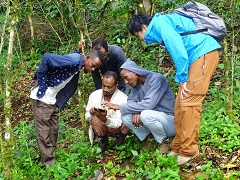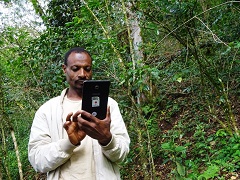- Home
- Technical Cooperation Projects
- Index of Countries
- Africa
- Ethiopia
- Project for Supporting Sustainable Forest Management through REDD+ and Certified Forest Coffee Production and Promotion
- Project News
- JICA Teaches Forest Conservation, Farmers get Tablets
Project News
2018-11-09
JICA Teaches Forest Conservation, Farmers get Tablets
Thirty percent of the Earth's surface is covered in forests. These forests are home to millions of creatures and plant species, as well as a source of clean water and air. However, growing populations and desertification are contributing to unprecedented levels of forest coverage loss in Africa. In Ethiopia, Belete-Gera Forest is facing similar pressures as surrounding inhabitants cut down trees on the edges of 150,000 hectares of forest, to expand agricultural land as well as for construction and firewood.
JICA has been intervening in the region since 2003 to develop a participatory forest management (PFM) system. It has implemented programs to train local famers on conservation practices and equip them with the skills needed to harvest the forest in a sustainable manner.
Participatory forest management is vital to the success of the program. Farmers need to play an active role in taking care of the forest, which has led to the establishment of 124 WaBuBs (associations), with 100 to 150 farmers in each. Each WaBuBs is educated on the benefits and necessity of conservation so that members can serve as guardians of the forest.
This year, JICA provided six tablets to six Wabubs to assist them with their work. The tablets, which have GPS locators enabled in them, serve the dual purpose of easing the farmer's data collection process while ensuring accountability by tracking the movement of farmers within the forest. Famers input data, in one of three languages (English, Amharic or Oromifa), and answer questions on whether they have been hunting animals in the forest, cutting down trees for firewood, contaminating water bodies or planting prohibited plant varieties. The information gathered is then submitted to the Oromia Forest and Wildlife Enterprise (OFWE) and is used to adjust its conservation strategy and training based on the results.
Around 1.6 billion people depend on forests for their livelihoods around the world. In Ethiopia, the south-west area, including Belete-Gera, supplies the majority of Ethiopia's global coffee export. The Ethiopian government is aware of the urgency to protect the forest while guarding the livelihoods of surrounding communities. It has launched a 10-year national forest development program and is striving to meet the United Nations Sustainable Development Goals, by 2030, with the aid of development partners.
 Farmers are inputting data into the tablet, under the supervision of a Japanese expert.
Farmers are inputting data into the tablet, under the supervision of a Japanese expert.
 A farmer inputs data about conservation efforts in the forest.
A farmer inputs data about conservation efforts in the forest.
- About JICA
- News & Features
- Countries & Regions
- Our Work
- Thematic Issues
- Types of Assistance
- Partnerships with Other Development Partners
- Climate Change / Environmental and Social Considerations
- Evaluations
- Compliance and Anti-corruption
- Science and Technology Cooperation on Global Issues
- Research
- JICA Development Studies Program / JICA Chair
- Support for the Acceptance of Foreign HRs / Multicultural and Inclusive Community
- Publications
- Investor Relations
